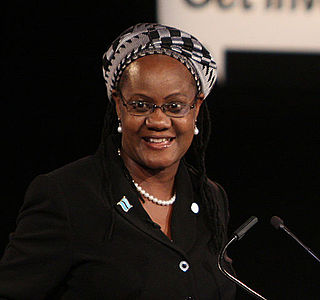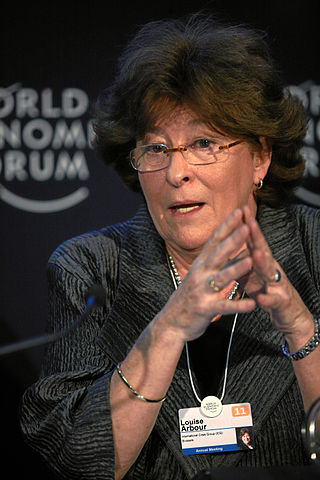Related Research Articles

Maryan Street is a New Zealand unionist and former member of the New Zealand House of Representatives, having been elected to parliament in the 2005 general election as a member of the New Zealand Labour Party. She served as the Minister of Housing and Minister for ACC in the final years of the Fifth Labour Government and was the first openly lesbian MP elected to the New Zealand Parliament.
Contributing to the establishment of human rights system in Africa are the United Nations, international law and the African Union which have positively influenced the betterment the human rights situation in the continent. However, extensive human rights abuses still occur in many sections of the continent. Most of the violations can be attributed to political instability, racial discrimination, corruption, post-colonialism, economic scarcity, ignorance, illness, religious bigotry, debt and bad financial management, monopoly of power, lack/absence of judicial and press autonomy, and border conflicts. Many of the provisions contained in regional, national, continental, and global agreements remained unaccomplished.
Kellelo Justina Mafoso-Guni is a Mosotho lawyer, the first female lawyer in Lesotho, as well as a former justice of the African Court on Human and Peoples' Rights and the High Court of Lesotho.

Catherine Margaret Branson is a former Australian judge and public servant. She was a judge of the Federal Court of Australia from 1994 to 2008, and then President of the Australian Human Rights Commission from 2008 to 2012.

Lindiwe Nonceba Sisulu is a South African politician. She was member of parliament from 1994 until 2023, and is a member of the National Executive Committee of the African National Congress as of 2023. She previously served as Minister of Housing, as Minister of Defence and Military Veterans, Minister of Public Service and Administration, Minister of Human Settlements from, Minister of International Relations and Cooperation, Minister of Human Settlements, Water and Sanitation and Minister of Tourism.

Virginia Mary Kendall is an American attorney and jurist serving as a United States district judge of the United States District Court for the Northern District of Illinois. President George W. Bush appointed her to the bench on January 3, 2006. In addition to serving on the bench, Judge Kendall is also a noted expert on child exploitation and human trafficking, as well as an adjunct professor and author.

The human-rights situation in Benin is considered to be generally above average for sub-Saharan Africa.
Iceland is generally considered to be one of the leading countries in the world in regard to the human rights enjoyed by its citizens. Human rights are guaranteed by Sections VI and VII of Iceland's Constitution. Since 1989, a post of Ombudsman exists. Elections are free and fair, security forces report to civilian authorities, there is no state violence, and human rights groups are allowed to operate without restriction. Religious freedom is guaranteed, and discrimination based on sexual orientation is illegal.
The Republic of Vanuatu is a parliamentary democracy with a population of approximately 326.000. The Constitution of Vanuatu is supreme law and sets out the legal framework which deals with the respect of human rights.

Angellah Jasmine Mbelwa Kairuki is a Tanzanian CCM politician and cabinet Minister. On 1 September 2023, she began her post as the Minister of Natural Resources and Tourism of Tanzania.

Athaliah Molokomme was the attorney general of Botswana until 2017 and is the first woman to hold that position. Molokomme has been committed to advocacy for women's rights at conferences, workshops, and seminars around the world. Dr. Athaliah Molokomme was appointed as Permanent Representative of Botswana to the UN in Geneva and Ambassador to Switzerland in May 2018.

Women in law describes the role played by women in the legal profession and related occupations, which includes lawyers, paralegals, prosecutors, judges, legal scholars, law professors and law school deans.

The Constitution of Lesotho is the basic law governing the Kingdom of Lesotho. It provides the legal framework for the structure of the government and lays out the rights guaranteed to citizens. The Constitution was adopted in 1993. It aimed to distribute power among three branches of government, while preserving the power of the monarchy.
Adrienne Ekila Liyonda was a Zairean politician who served as ambassador to Belgium and was the country's first female Foreign minister.
The Southern Africa Litigation Centre or SALC is a non-profit organization based in Johannesburg, South Africa which supports human rights lawyers in Southern Africa countries with expert legal advice, technical support and funding. SALC was founded by Nicole Fritz and she served as director for ten years. Kaajal Ramjathan-Keogh was thereafter appointed director and was later replaced by Anneke Meerkotter.
Tujilane Rose Chizumila is a Malawian lawyer and jurist who was appointed to the African Court on Human and Peoples' Rights for a six-year term in 2017.
Chanju Samantha Mwale is a Malawian lawyer and army officer. She was the first female lawyer in the Malawian Defence Force and in 2016 became the first female officer of the Malawian Army to be promoted to the rank of lieutenant-colonel. She was transferred to a research role in 2016, a move she alleged was illegal and took to the Malawi High Court. The court did not hear the case and Mwale chose to retire from the army.

Human rights in Namibia are currently recognised and protected by the Namibian constitution formed in 1990 by a 72-seat assembly. The assembly consisted of differing political parties. After a draft, the constitution was agreed upon by all members of the seven political parties involved. 21 March 1990 marks the first day Namibia operated under the Constitution and also marks the recognition of Namibia as an independent nation. Chapter 3 of the constitution entitled Fundamental Human Rights and Freedoms, also referred to as the Bill of Rights, outlines the human rights of all Namibian citizens.

Reine Adélaïde Sophie Alapini-Gansou is a Beninese jurist who is a judge of the International Criminal Court since March 2018.
Aloysie Cyanzayire is a lawyer, judge, public servant, and former president of the Supreme Court of Rwanda, currently serving her second term as Supreme Court justice. She is the first female president of the Supreme Court in Rwanda’s history.
References
- 1 2 3 4 "New Ombudswoman takes office" (in German). International Ombudsman Institute. Retrieved 10 November 2017.
- 1 2 3 4 "Fanana appointed Ombudsman". Lesotho Times. 1 December 2010. Archived from the original on 11 November 2017. Retrieved 10 November 2017.
- ↑ N.A.M., Fanana (1989). "Inheritance Law and Women in Lesotho". Africa Bib. Paper presented at the Regional Seminar on Women's Law in Southern Africa, March, 1989, Harare, Zimbabwe. Retrieved 11 November 2017.
- ↑ "Ombudsman annual report 2012/13" (PDF). The Office of the Ombudsman. p. 1. Archived from the original (PDF) on 2017-11-12. Retrieved 2017-11-11.
- ↑ "Roundtable Dialogue on Skills Reform for Innovation and Growth in Lesotho" (PDF). World Bank. Retrieved 11 November 2017.
- ↑ "The Peoples' Rights Under the African Charter on Human and Peoples' Rights". Lesotho Law Journal. 10 (48). 1997.
- ↑ "Legal Dualism and the Rights of Women: Thoughts for. Law Reform in Lesotho". Lesotho Law Journal. 14 (1): 133–140. 2001.